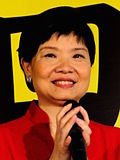Civic Party 公民黨 | |
|---|---|
 | |
| Abbreviation | CP |
| Founded | 19 March 2006 |
| Dissolved | 27 May 2023 |
| Preceded by | Article 45 Concern Group |
| Headquarters | Unit 202, 2/F, Block B, Sea View Estate, 4–6 Watson Road, North Point, Hong Kong |
| Youth wing | Young Civics |
| Membership (2021) | ~849 |
| Ideology | Constitutionalism Liberalism (Hong Kong) Social liberalism [1] |
| Political position | Centre-left [2] |
| Regional affiliation | Pro-democracy camp |
| Colours | Violet, white and green |
| Slogan | The Civic Way, The Fairer Way |
| Website | |
| civicparty.hk (archived) | |
| Civic Party | |||||||||||||||||||||||
|---|---|---|---|---|---|---|---|---|---|---|---|---|---|---|---|---|---|---|---|---|---|---|---|
| Traditional Chinese | 公民黨 | ||||||||||||||||||||||
| Simplified Chinese | 公民党 | ||||||||||||||||||||||
| |||||||||||||||||||||||
| This article is part of a series on |
| Liberalism in Hong Kong |
|---|
 |
 |
| Politics and government of Hong Kong |
| Related topics |
The Civic Party (CP) was a pro-democracy liberal political party from March 2006 to May 2023 in Hong Kong.
Contents
- Party beliefs
- History
- Founding
- Eu leadership (2006–2011)
- Leong leadership (2011–2016)
- Yeung leadership (2016–2021)
- Disbandment
- Structure
- Election results
- Chief Executive elections
- Legislative Council elections
- District Council elections
- Leadership
- Overall structure
- Leaders
- Chairpersons
- Vice-chairpersons (external affairs)
- Vice-chairpersons (internal affairs)
- Secretaries general
- Treasurers
- References
- External links
The party was formed in 2006 on the basis of the Basic Law Article 45 Concern Group, which was derived from the Basic Law Article 23 Concern Group that rooted in its opposition to the proposed legislation of the Article 23 of the Basic Law of Hong Kong. Mainly composed of leading barristers, the party first contested in the 2007 Chief Executive election with Alan Leong unsuccessfully challenged incumbent Donald Tsang elected by the Election Committee.
The Civic Party joined the League of Social Democrats (LSD) in the "Five Constituencies Referendum" campaign in 2010 to pressure the government to implement the universal suffrage of the Chief Executive and Legislative Council in 2012 over the constitutional reform package. In the 2012 Legislative Council election, the party took an aggressive electoral strategy, which resulted in winning six seats and overtaking the Democratic Party in vote share.
In light of the rise of localism, the Civic Party speeded up its rejuvenation and localisation after its candidate Alvin Yeung defeated Edward Leung of the Hong Kong Indigenous in the 2016 New Territories East by-election, which Yeung became the party leader later in the year. The party received a largest victory by winning 32 seats in the 2019 District Council election in the midst of the citywide anti-government protests.
In July 2020 after Beijing installed the national security law on Hong Kong, three of the five Civic incumbent legislators, Alvin Yeung, Kwok Ka-ki and Dennis Kwok were barred from running for re-election and subsequently unseated, which resulted in the mass resignations of the pro-democracy legislators, leaving the party with no representation in the legislature for the first time and Yeung's resignation as party leader. After all local councillors resigned from office or from the party in late 2021 as threats of disqualification loomed, the party turned low profile. [3] [4] The party dissolved itself in May 2023. [5]




